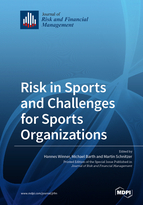Risk in Sports and Challenges for Sports Organizations
A special issue of Journal of Risk and Financial Management (ISSN 1911-8074). This special issue belongs to the section "Applied Economics and Finance".
Deadline for manuscript submissions: closed (31 October 2022) | Viewed by 41588
Special Issue Editors
Interests: public economics; public health; sports economics; applied econometrics
Interests: sports economics; talent development in sports; epidemiology of alpine sports; machine learning
Special Issue Information
Dear Colleagues,
Success, injuries, future career opportunities of athletes, but also societal gains of participating in sports and of organizing (mega) sports events are all related to individual risk-taking behavior. Although the sports economics and management literatures have broadly addressed these issues, it is surprising that less attention has been paid to the implications of risk-taking on the organization of sports in general and, more particularly, on the design and behavior of sports organization members. This Special Issue attempts to fill this gap, inviting authors to contribute to the following fields of research:
(i) Risk-taking in elite sports production (e.g., risky decisions under competitive pressure, the decision to comply with the rules of competition including doping decisions, hiring decisions of teams, athletes’ decisions to determine their future career path);
(ii) Community risk-taking in organizing sports events (e.g., economic evaluation of mega events, attitudes of a community’s population towards sports events);
(iii) Implications of risk-taking for the organization of sports in general and for sports organizations in particular (e.g., insurance-related issues of sports participation or treatment of corrupt behavior in sports). We are also interested on how the recent COVID-19 crises has changed risk-taking in sports and particularly the above-mentioned organizational aspects of sports.
This Special Issue focuses generally on “Risk-Taking in Sports and Challenges for Sports Organizations”. It includes a broad range of issues, ranging from individual (athlete) or group risk-taking in sports to societal effects of organizing sports events. We are particularly interested in the implications of risk-taking for the organization of sports in general and sports organizations in particular.
We welcome theoretical and empirical papers on the above-mentioned issues, also taking the perspective of different actors in sports (athletes, trainers, team owners, viewers, and other stakeholders such as sponsors, event organizers, and sports organizations). We also encourage interdisciplinary contributions.
Prof. Dr. Hannes Winner
Dr. Michael Barth
Prof. Dr. Martin Schnitzer
Guest Editors
Manuscript Submission Information
Manuscripts should be submitted online at www.mdpi.com by registering and logging in to this website. Once you are registered, click here to go to the submission form. Manuscripts can be submitted until the deadline. All submissions that pass pre-check are peer-reviewed. Accepted papers will be published continuously in the journal (as soon as accepted) and will be listed together on the special issue website. Research articles, review articles as well as short communications are invited. For planned papers, a title and short abstract (about 100 words) can be sent to the Editorial Office for announcement on this website.
Submitted manuscripts should not have been published previously, nor be under consideration for publication elsewhere (except conference proceedings papers). All manuscripts are thoroughly refereed through a single-blind peer-review process. A guide for authors and other relevant information for submission of manuscripts is available on the Instructions for Authors page. Journal of Risk and Financial Management is an international peer-reviewed open access monthly journal published by MDPI.
Please visit the Instructions for Authors page before submitting a manuscript. The Article Processing Charge (APC) for publication in this open access journal is 1400 CHF (Swiss Francs). Submitted papers should be well formatted and use good English. Authors may use MDPI's English editing service prior to publication or during author revisions.
Keywords
- sports economics
- sports management
- risk-taking in professional sports (e.g., doping, injuries, post-career path)
- risk-taking in organizing (mega) sports events
- implications of risk-taking on the organization of sports
- risk treatment in sports organizations
- risk taking after COVID-19 pandemic







